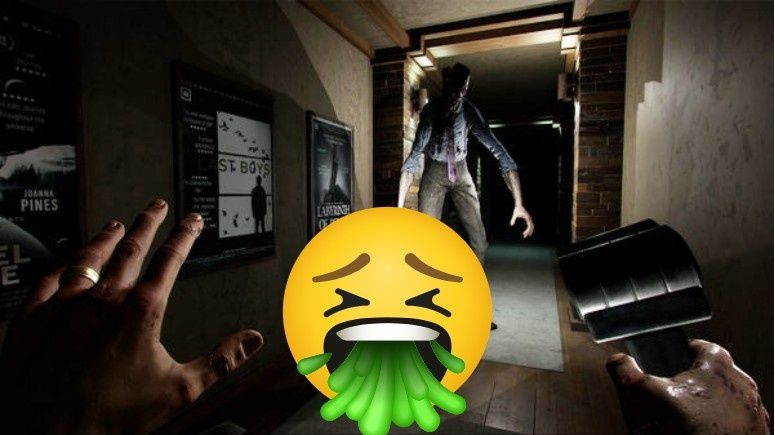
[ad_1]
Wraith: The Oblivion — Afterlife (WTOA) is a new hair-raising VR horror game that had me spewing out a self-assuring chant to calm my nerves: “This is just a game. What you’re seeing is not real. Don’t be afraid. You are safe in your living room.” Unfortunately, no matter how many times I repeated this mantra, I couldn’t convince my mind nor my body that I was not in grave danger.
WTOA, developed by Stockholm-based Fast Travel Games, is my first foray in the VR horror world. Initially, it didn’t seem too bad. I ran into a few ghastly apparitions here and there, but they minded their own business — at first. This is how I like my ghosts. Don’t start none, won’t be none! However, as you progress in the game, there are some gnarly supernatural occurrences that will make you jump out of your skin.
So what was it like to play a VR horror game for the first time? Imagine spotting black holes in walls that, at first glance, seem like innocuous cracks, but as you inspect them more closely, the holes creepily expand into large dark portals, inviting you to step inside the wall’s unearthly gaping mouth.

Think about how your skin would prickle after seeing a bloodied corpse hanging from the ceiling, and then suddenly, it wails, “It hurts so, so much!” Imagine how many somersaults your stomach would do before opening every single door because you know a demonic abomination lies ahead.
I’ve always loved thrilling horror games like Outlast, Amnesia: Dark Descent and Little Nightmares 2, but I played those titles on PC. Stepping into the world of VR horror, however, is a whole other level of immersion that I’m not sure I can handle.
Wraith: The Oblivion — Afterlife graphics are a little too convincing
Fast Travel Games sent me a demo of WTOA, allowing me to plunge into the first hour of the game before it’s released to the public in April. When you first step into WTOA, you’ll find yourself on an otherworldly planet stripped of any life or vegetation. There’s nothing but rubble and pebbles on the ground as large, sharp boulders surround you — the climate is dark, uninviting and windy with foreboding gray clouds.

If that isn’t creepy enough, you’ll see a shadowy figure ahead, waiting for you to approach him. In real life, I would have bolted. There is no reason for me to go toe-to-toe with some supernatural freak when I can make a beeline to safety. However, WTOA forced me to confront my fears, which, as I’ll explain later, is one of the core advantages of playing VR horror.
You’ll quickly realize that you’re not some poor lost soul who’s wandered into the wrong side of town. Au contraire, you’re exactly where you’re supposed to be: the afterlife. When you look down at your hands, you’ll find gashes, dried blood, cuts and burns on your palms. You’re dead. As such, you’re in search of answers to pressing questions: Who — or what — killed you? Why are you trapped in this ethereal realm? A millionaire’s opulent residence called Barclay Mansion looms before you. It’s gorgeous on the outside, but trust me — it’s ugly on the inside (and I’m not just talking about the decor). This is where you died.

Although I ran WTOA on the Oculus Quest 2 (a standalone VR headset sans the aid of a PC), I’m impressed with the graphics. It’s not “holy crap, this is a total replica of reality” good, but the graphics are convincing enough to send chills down your spine as you walk through the cursed halls of the Barclay Mansion. Truth be told, after playing WTOA, VR horror is a gaming niche that needn’t enter the era of high-fidelity graphics — it’d cause too many heart attacks around the world.
Wraith: The Oblivion — Afterlife: the game mechanics are familiar
Fortunately, Ed Miller — the main protagonist of the game — isn’t completely defenseless in this abysmal WTOA world. The first supernatural power you acquire lets you summon objects into your hands and throw them, which is reminiscent of Half-Life: Alyx’s gravity gloves.

Ed also has sharpened senses. When he points his hand in the right direction (the path of his next objective), you’ll hear the sound of a quickened heartbeat. This reminds me of the Dishonored series; in that game, the protagonist Corvo Attano uses a heart to determine whether he’s close to supernatural currencies that can buy him new powers. The closer he is, the faster the heart beats.
Horror-game developers love using cameras as tools and WTOA is no different. You’ll learn that Ed is a photographer who was hired to chronicle a seance inside the Barclay Mansion, which is notorious for hosting opulent, decadent parties for the rich-and-famous Hollyweird — er, I mean Hollywood — crowd. In the spiritual realm, however, Ed’s camera can be used to reveal hidden memories that uncover mysteries about his death and what happened inside the Barclay Mansion.

You’ll also find a flash bulb in the game, which melts away otherworldly vines that block paths and doorways. Additionally, it can be used to light up dark areas and scare off Spectres (ghosts that will have no mercy on your soul if they spot you). When it comes to Spectres, you’ll want to use your cat-like stealth skills to sneak by those hostile suckers by crouching and laying low.
Is Wraith: The Oblivion — Afterlife scary?
Heck yeah, WTOA is scary — to me at least! You don’t want to make the mistake of playing this game before going to bed. Before diving into WTOA, a Fast Travel Games rep told me that the creators didn’t want to use cheap jump scares to have gamers shaking in their boots. Instead, they wanted to generate high-tension vibes throughout the Barclay Mansion

Although the creators may not have intended to create jumpscare moments, there were many times that I damn-near jumped out of my skin after unexpectedly running into terrifying Spectres — and those things will hunt you down like a bloodhound. “‘Dammit! I thought there were no jump scares!” I muttered bitterly. What’s worse is that Ed runs like a three-legged baby deer. No matter how much pressure you put on the sprint button, it feels like Ed is frolicking through a dreamy meadow while being chased by spawns of Satan. This is intentional, though — maneuvering through the Barclay Mansion is supposed to feel like you’re wading knee-deep in quicksand. If Ed was a fast runner, our sense of security would be too high.

In real life, one of my biggest fears is fumbling to unlock a door while a murderer is just inches away from lunging at me. WTOA recreates this moment: you may sometimes find yourself needing to use a key to unlock a door and escape a Spectre, but your frazzled nerves may thwart you from unlocking it quickly and efficiently.
Wraith: The Oblivion — Afterlife made me puke
WTOA had my stomach in knots. I’m not sure what spurred the illness. I’ve never gotten VR motion sickness before and I’ve played countless vomit-inducing Oculus Quest 2 games from Epic Roller Coasters to Richie’s Plank Experience, but WTOA made me feel abnormally nauseous.
I also wondered if seeing a screeching corpse hanging on the noose caused the queasiness, but I’m now certain that it was the motion sickness that got to me.

“What’s happening [with motion sickness] is that the brain’s getting mixed messages. It’s getting signals from the muscles and the eyes saying that we are still and signals from the balance sensors saying we’re in motion. Both of these cannot be correct. There’s a sensory mismatch there,” Neuroscientist Dean Burnett explained. “So the brain thinks it’s being poisoned. When it’s been poisoned, the first thing it does is get rid of the poison — aka throwing up.”
This makes sense since I was standing still throughout the whole game, but at the same time, my brain was convinced that I was gliding through a creepy mansion, causing me to feel ill. When this happened, I simply turned off the game and revisited WTOA the next day. Thankfully, my nausea didn’t persist while I finished the demo.
Outlook
Wraith: The Oblivion — Afterlife was my first VR horror experience. For a lack of a better description of how I’m feeling post-WTOA, I’m pretty sure my heart fell out of my ass and I’m still searching for it. I thought I’d be able to stomach WTOA, but as it turns out, I’m a total wuss.

As mentioned, one of the key advantages of VR horror is that it can serve as a mode of exposure therapy to confront your fears. WTOA discourages you from running away from your problems and pushes you to confront terrifying situations that are uncomfortable, distressing and perturbing. I wouldn’t be surprised if VR horror gamers develop tougher skin in real life after confronting vicious enemies in virtual reality.
Kudos to Fast Travel Games (composed of the developer behind games like Mirror’s Edge, Angry Birds 2 and the Battlefield series) for creating a spine-tingling survival horror VR game that will have you turning sixteen shades of white (or green, in my case). It’s worth noting that WTOA has three trigger warnings: photosensitivity, death and suicide.
WTOA will be released on April 22 for the Oculus Quest and Rift headsets and Spring 2021 for Steam VR and PSVR.
[ad_2]
Source link




